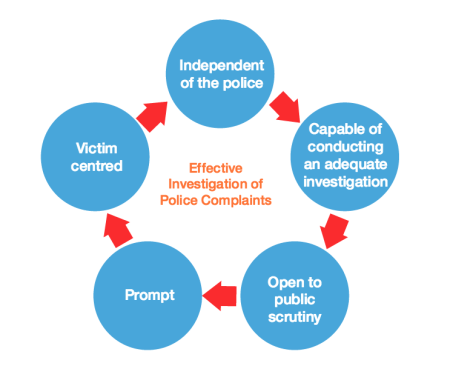For some time, we at the the Police Accountability Project have been assessing any proposed reforms to police complaints systems by the extent to which they meet the criteria identified in the United Nations Human Rights Committee decision in Horvath v Australia (2014). This has become known as the “Horvath Test”.
The “Horvath Test” is simple. If Corinna Horvath’s 1996 assault by Victoria police occurred again today, (and many assaults of a similar nature are reported to us regularly) would a new model of police investigation ensure justice or come close to meeting the requirements of the UN Human Rights Committee’s decision on Horvath.
The test poses an important hypothetical question. If the assault that Corinna Horvath experienced in 1996 occurred again, would that complaint be investigated, adjudicated and redressed in a just, timely, efficient and transparent manner or would a person in a similar predicament have to go through years of arduous, costly and protracted court processes to receive justice?
The Horvath v Australia decision obligates the Australian Government to ensure that victims of police human rights abuses have a right to appropriate remedy and the ability to have complaints relating to police abuse heard by an independent body. It asserts important elements of international law directly upon Australia’s police complaint handling systems.
Bodies that rely upon “oversight” or even “active oversight” of police complaints simply do not meet the Horvath Test. The Independent Broad-Based Anti-corruption Commission (IBAC) in Victoria and the new Law Enforcement Conduct Commission (LECC) in NSW, do not meet the requirements of the Horvath Test.
The current police complaints systems across Australia lack integrity, transparency and independence. Few people wish to proceed with a complaint once they understand that it will be investigated internally. Opportunities for improvements in police effectiveness, safety and professionalism are therefore lost.
Under international law, an independent and effective investigation has five elements.[29] These are identified in the following diagram.

It has taken twenty years for the treatment of Corinna Horvath and the actions of police to be adjudicated independently and scrutinized by the criminal courts. The onus rests upon all Australian governments to ensure that victims of human rights abuses do not have to endure a similar plight.
Any new investigative body in any state must be empowered to be independent of the police, prompt, open to public scrutiny, and victim-centred; enabling the victim to fully participate in the investigation and access information, and able to conduct effective investigation of police complaints.
Only then will we begin to meet the “Horvath Test”.
Anthony Kelly
Executive Officer, Flemington Kensington Community Legal Centre
See also:
Background to the extraordinary case of Corinna Horvath can be found at https://www.policeaccountability.org.au/corinna-horvath/

For more information:
Making Human Rights Matter To IBAC
IBAC Recomendations fail the “Horvath Test”
How Should Police Complaints be Investigated in Victoria?
“Bodies that rely upon “oversight” or even “active oversight” of police complaints simply do not meet the Horvath Test.”




